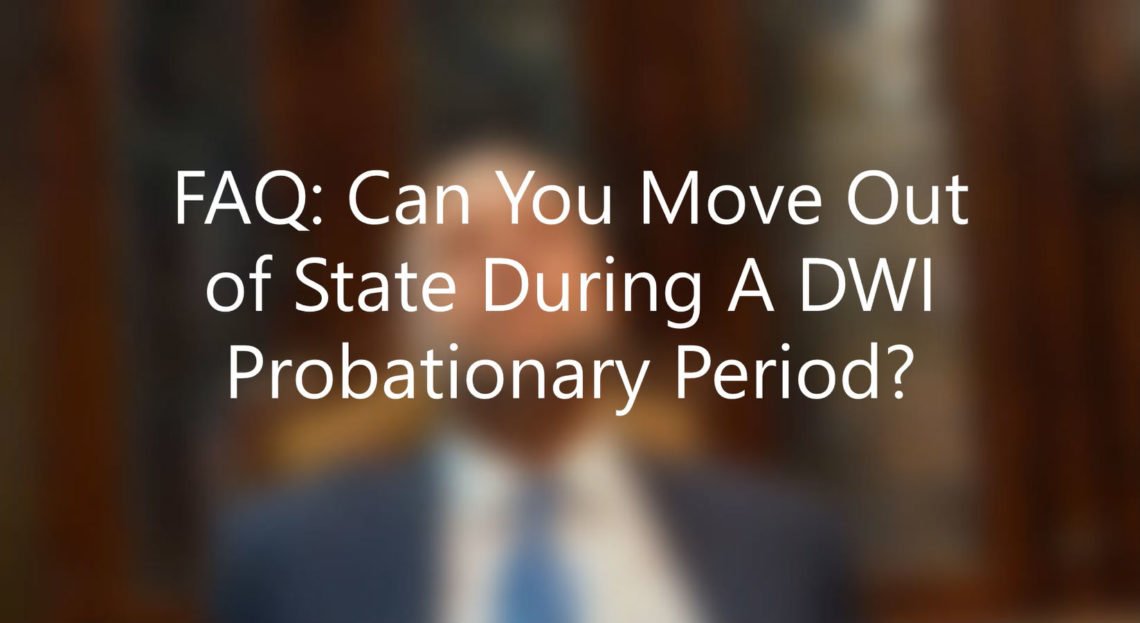Can You Move Out of State With a Pending Dui
If you have a pending DUI, you may be wondering if you can move out of state. The answer is it depends. If you are moving to another state with the intention of continuing to drink and drive, then the answer is no.
You will most likely have your driver’s license suspended or revoked in that state as well. However, if you are moving to another state with the intention of getting treatment for your drinking problem and abstaining from driving while intoxicated, then the answer is yes, you can move out of state with a pending DUI.
- Begin by researching the laws in your new state
- You will need to know what the consequences are for driving under the influence (DUI) in your new location
- Next, you will need to take care of any outstanding DUI-related charges in your current state
- This may include attending court appearances and paying fines
- Once you have taken care of any legal obligations in your old state, you can begin making plans to move
- This may involve hiring a moving company or renting a truck
- Be sure to update your driver’s license and vehicle registration once you arrive in your new state
- You will also need to obtain insurance coverage that meets the requirements of your new home state
- Finally, make sure you are familiar with the DUI laws in your new location so that you can avoid getting pulled over and facing more penalties

Credit: www.dougmurphylaw.com
Can You Move Out of State With a Pending Dui
If you have a pending DUI case in one state and move to another, the consequences can be serious. Depending on the severity of the charge, a DUI is typically a felony offense. This means that if you are convicted of a DUI in one state and then move to another, you may be subject to extradition – meaning the authorities in your new state can force you to return to face charges in the original state.
Additionally, even if your DUI charge is ultimately dismissed or reduced, simply having a pending DUI case on your record can make it difficult to find employment, housing, or obtain professional licenses in some states. So while it may be possible to move out of state with a pending DUI case, it is generally not advisable.
However, It is Important to Keep in Mind That the Dui Will Still Show Up on Your Record And May Impact Your Ability to Get Insurance Or Drive in Some States
It is important to keep in mind that a DUI will still show up on your record and may impact your ability to get insurance or drive in some states. A DUI is considered a serious offense and can lead to jail time, fines, and the loss of your driver’s license. If you are convicted of a DUI, you will have a criminal record which can make it difficult to find employment or housing.
In addition, your insurance rates will increase and you may be required to install an ignition interlock device in your vehicle.
If You are Convicted of the Dui, You Will Also Be Required to Complete Any Sentence Imposed by the Court, Which May Include Jail Time, Probation, And/Or Community Service
If you are convicted of a DUI, the consequences will vary depending on the severity of the offense and your state’s laws. However, you can expect to face some combination of the following penalties:
Jail time: This is typically reserved for more serious offenses, or if you have multiple DUIs on your record.
The amount of time you’ll spend in jail will depend on the specifics of your case, but it could be anywhere from a few days to several months.
Probation: You may be placed on probation for a period of time, during which you’ll be required to adhere to certain conditions set by the court. These conditions may include things like attending Alcoholics Anonymous meetings, completing an alcohol education program, and/or submit to regular breathalyzer tests.
If you violate any of the terms of your probation, you could be sent to jail.
Community service: You may be required to perform community service as part of your sentence. The number of hours will again depend on the details of your case, but it could be anywhere from 20 hours to hundreds.
Fines and fees: In addition to any other penalties imposed by the court, you’ll also likely have to pay various fines and fees related to your DUI conviction. These can range from a few hundred dollars to several thousand, depending on the circumstances.
13 – FAQ: Can I Move Out Of State With A Pending DWI?
States That Don’T Count Out of State Dui
If you’re caught driving under the influence in a state that doesn’t count out-of-state DUI, you may be subject to some serious penalties. In some cases, you may even be required to complete an alcohol treatment program.
Each state has its own laws regarding DUI, so it’s important to know the laws of the state in which you’re driving.
If you’re caught driving under the influence in a state that doesn’t count out-of-state DUI, you may be subject to some serious penalties. In some cases, you may even be required to complete an alcohol treatment program.
The states that don’t count out-of-state DUI include: Alabama, Arizona, Arkansas, Colorado, Florida, Georgia, Idaho, Indiana, Iowa, Kansas, Kentucky Louisiana Maine Maryland Massachusetts Michigan Minnesota Mississippi Missouri Montana Nebraska Nevada New Hampshire New Jersey New Mexico North Carolina North Dakota Ohio Oklahoma Pennsylvania Rhode Island South Carolina South Dakota Tennessee Texas Utah Vermont Virginia Washington West Virginia Wisconsin Wyoming
If you’re caught driving under the influence in any of these states and found to have a blood alcohol content (BAC) of .08% or higher (.02% for commercial drivers), you can expect to face harsh penalties. These can include jail time , loss of your driver’s license , and expensive fines . You may also be required to complete an alcohol treatment program .
Conclusion
If you are facing a DUI charge, you may be wondering if you can simply move to another state to start over. Unfortunately, it’s not that easy. If you have a pending DUI case, the court will likely require you to appear for all scheduled hearings.
If you fail to do so, a warrant may be issued for your arrest. In some cases, the court may allow you to participate in proceedings via teleconference, but this is typically only allowed in very limited circumstances. So, if you are facing a DUI charge and are considering moving out of state, it’s important to consult with an experienced attorney first.





